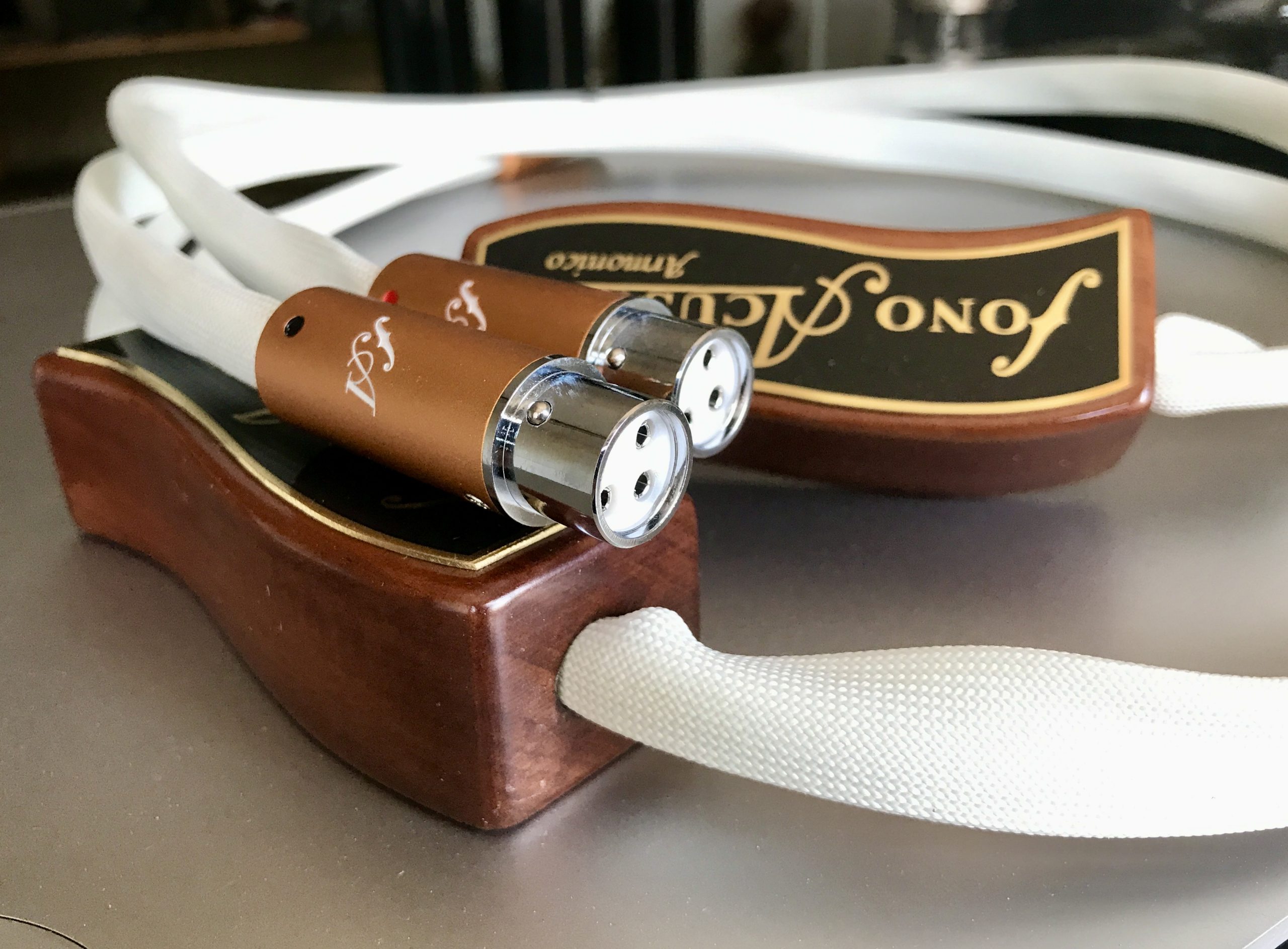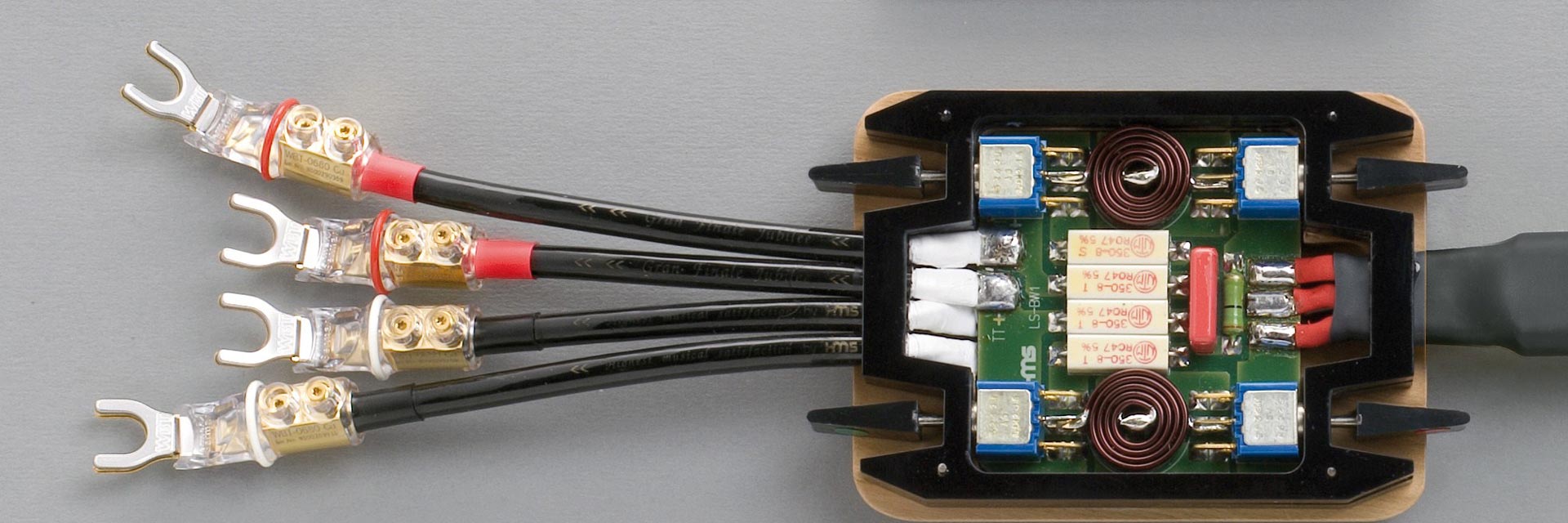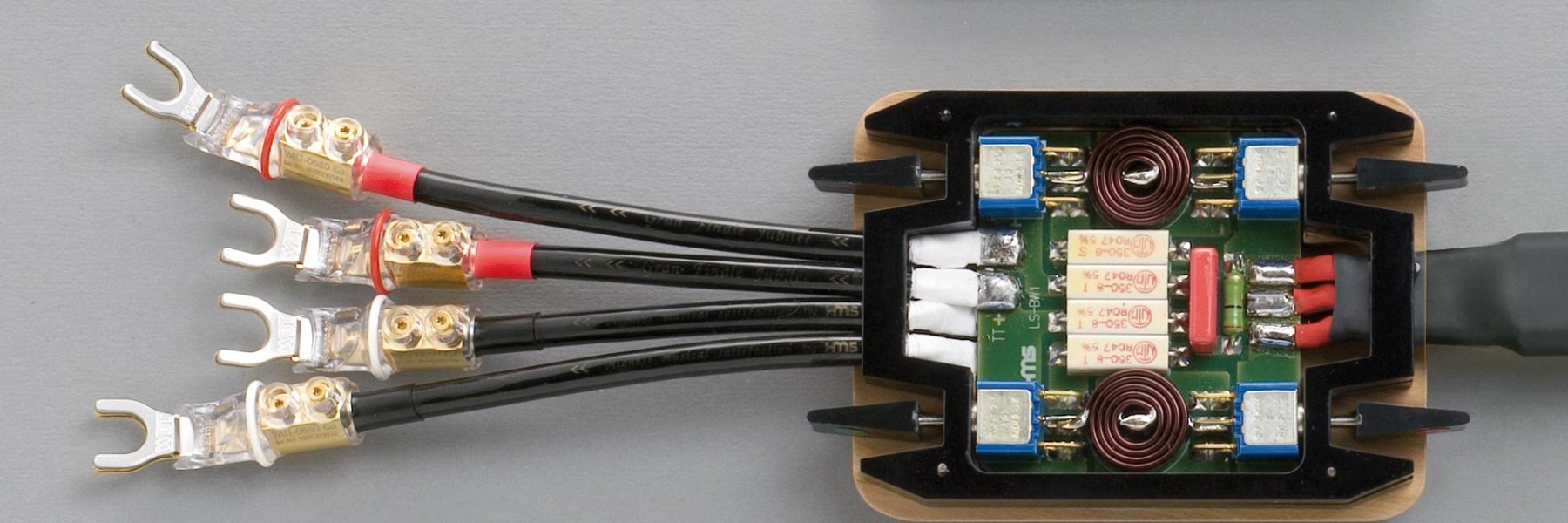FYI: An argument for buying cables first:

Yes Roger Skoff is entertaining. He's also in the audiophile cable business. He's not the first manufacturer I've heard who believes his product category is the foundation of a system.
FYI: An argument for buying cables first:

the ingedients of the dish are the caps resistors inductors valves &/or transistors wire etc. The finished component is the dish. assembling the components as a system is the meal. cables are the forks and spoonssnip- Saying that "if you have to use cables to tune your components you bought the wrong components" is like saying that if you have to season the dish you are cooking with spices, you bought the wrong ingredients. -snip
For those posters looking for cables that add or subtract nothing - I hope you find them.
Nothing new or "different" about using live music as a reference. I (and every other audiophile I know) have been doing that since the first publication of "The Absolute Sound". Attending as many live performances as possible certainly helps keep the sound of real instruments and voices in your "mind's ear", but practically speaking comparisons between live and recorded music are necessarily from memory, which doesn't make them less valid or useful. It is also the common, universal experience of long term audiophiles that after listening to many different components (I view cables as a component) over many years they've assembled a system that to their ears gets them close to live musical performances. As always when the discussion turns to cables things start to get a little squirrelly. If I understand, you are saying that you want cables that don't alter the "general character" (which is only knowable via cables) of the component they are attached to (i.e., "neutral" cables) unless said cables get your component/system closer to the sound of live music, in which case it is OK if they aren't neutral. So at the end of the day you prioritize musicality over neutrality. Have I misrepresented what you wrote?Of course there is no true neutral - or put differently, neutral is relative to what you are comparing. Yes, all cables impart some signature to the signal coming off the source, some more so than others. Yes cables are necessary. Imo, most audiophile cables intend to have a character and imbue that character into/onto the overall sound of your system. I suspect many people want that to be the case.
Some folks for many different reasons, believe their system's sound is not what they want or are looking for improvement either specifically or they have some vague sense of improvement that they will know when they hear it. Some people get bored with the sound they have and simply want a change. Cables are typically a less expensive way to making a change relative to the cost of speakers, amplifiers, turntables, etc. It is not unusual to find people trying a variety of cables until they find something that satisfies them for now.
I'm trying a different approach with a couple different aspects to it. This may not be for everyone.
One, I use the sound of live acoustic music to assess how my system sounds and as a reference for guiding how I build or alter that system. Two, I want to minimize the number of factors that influence or manipulate my system's sound as directed by my goal. Having a reference makes the job easier for me than relying on my personal whimsy. (I can indulge that with different music.)
Over years of listening to a variety of components, I've found some that bring me closer to my goal than others. Granted we only evaluate components with cables tying them together. I believe a component's character can come through across different connecting wires. If a wire causes a sound that is fundamentally different than the general character of the component as gauged otherwise, then I'm not interested except in the case where I hear a sound that brings my ears closer to the sound of live acoustic music. I am interested in cabling that causes the least difference to the sound of my components - you can think of that as a process of winnowing. ymmv

If I understand, you are saying that you want cables that don't alter the "general character" (which is only knowable via cables) of the component they are attached to (i.e., "neutral" cables) unless said cables get your component/system closer to the sound of live music, in which case it is OK if they aren't neutral. So at the end of the day you prioritize musicality over neutrality.
Have I misrepresented what you wrote?
Now you are effectively changing your post. The context in which I used "neutrality" was taken directly from your post, i.e., wire that doesn't add or subtract anything leaving the general character of a component fundamentally unchanged. Direct quote from your original post:If I understand, you are saying that you want cables that don't alter the "general character" (which is only knowable via cables) of the component they are attached to(i.e., "neutral" cables) unless said cables get your component/system closer to the sound of live music, in which case it is OK if they aren't neutral. So at the end of the day you prioritize musicality over neutrality.
More representative with the above edit.
I mentioned neutrality in my original first sentence but do not claim it as a goal because I don't know what it means in the context you used it. I make a concerted effort not to use the word "musicality" because it lacks clear definition - I see it as a 'personal word', with a meaning as unique as the person using it. Musicality is not my reference.
To be clear, the part you quoted are your words trying to characterize part of a post I made and I crossed out the words I did not find representative of what I said after you asked me if your characterization were. Now you tell me I am disagreeing with myself.
Without meaning to be rude - do you some point or thesis to make in all this - hopefully a positive one? Sorry, but this doesn't seem to be going anywhere.
Btw, I see you are from DC. I was born there.
A lot of theory in this post. In practice power cable and other power product upgrades have made dramatic improvements in my system's sound quality. I have a 30A line from the main house breaker panel to a dedicated audio room breaker box, and a dedicated 20A line from there to a high end wall outlet. While this by itself reduced noise/improved my system's sound quality my power conditioner and high end power cables produced additional reductions in noise/improvements in sound quality that significantly exceeded what the dedicated line by itself produced. A high performing power cable to a power conditioner/distributor of course improves the sound of everything attached to it hence the "rule of thumb" to put one of your best PC's on the power conditioner.Power cables are a mix of dissimilar metals, various geometry, and utilize an inferior contact at both ends. A cables sonic signature is partly dependent on the receptacle and IEC its connected too. A cable is part of an overall system.
In the most general sense, a power cable is always detracting from the whole of the power delivery to any component. A pure electron delivery would be an unbroken wire from the clamp in the receptacle run unbroke to the lead out wire in the equipment power transformer. As soon as a power cord is introduced you added 6 breaks in said wire and a variety of dissimilar metal interfaces. Actually 18 as it applies to each wire. In short, its impossible for a power cord to not have a sound.
Consider a ching chen. What is it. Its 16 awg tin plated stranded copper wire welded to the receptacle blades and potted in a plastic resin. The potted ends are brilliant. Very little oxidation over time. A strong structure low in vibration transmission. On the other hand its a minimal gauge wire and plated with tin. Its stranded. It most definitely has a sound. A low watt amp with tinned IEC inlet might work well with a ching cheng. But I doubt a power hungry amp with a rhodium or silver coated IEC would sound that great.
The point I am trying to make is when you introduce a cable, you need to asses it's purpose. You need to asses the whole of the electrical infrastructure and component it will power.
For consideration, if you upgrade the behind the wall wiring infrastructure, every cable that is plugged into it functions at a higher level. The foundation affecte everything. A cord only affects what it is connected too. And I don't believe a cord ever makes anything better. Some do less damage than others.
If a power cable has noise reducing technology designed into it then it will reduce noise, assuming it is competently constructed. This includes resonance damping technology to deal with mechanical noise, and measures to absorb/dissipate/reject EMI and RFI, including noise cancelling conductor geometry, EMI/RFI absorbing compounds/materials, and shielding. Without mentioning specific brands/models (I can if anyone is interested), I have power cables that feature all of these measures, and my ears tell me that they work as advertised. My award winning power conditioner, which is passive, was credited in reviews with not only subtracting nothing from the sound but improving dynamics. Again, my ears agree. Each power cable/conditioner/filter/accessory upgrade I've kept over the years (I got rid of a bunch because they didn't make a significant difference) has incrementally reduced the grunge/veiling/grayish overlay that EMI can impart, and the telltale treble brightness, etch, glare, and electronic signature that RFI can cause, revealing more of the music. I have never had any problems with voltage sags or spikes, hum, clicks, pops, etc. Perhaps I have been lucky in terms of where I've lived. As I've stated elsewhere on this forum I currently have no remaining audible noise and am therefore not motivated to seek out additional noise reducing measures.I don't know I accept a high quality cable reduces noise. What noise are you talking about.
I do agree a power conditioner reduces noise, but again, what noise and at what frequency, and at what point in the system. And did that device do something to make the sound unnatural to some.
Understanding if a cable is better is not a daunting task if you have learned what to listen for and educated your ears. It is simple and straightforward, involving only critical, comparative listening, just like for other types of components. If you are "wondering if an expensive cable is actually better than a good $250 to $500 cable" I'm guessing that's because you haven't actually tested/compared top tier power cables. If I am wrong then please satisfy my curiosity by sharing which brands/models you've listened to, and how you experienced them. If you have not done this kind of critical, comparative listening then you are not in a position to make meaningful contributions to this forum about high end power cables.I find myself consternated over the subject of cables for a few reason.
Just to clarify, I do believe a well designed electrical system with good cables will shunt some frequencies of RF noise. Its not going to do anything for 3rd, 5th etc harmonics. I have never seen any filter remove this distortion. But some start working around 2kHz.
Also, how much noise is coupled to the chassis, tubes, wires in the equipment itself, and does the electrical system remove this. I don't think it removes much if any at all. I am beginning to see a ground box to be the device to remove this noise.
So the power cable?????? There are good reasons for them to be expensive. I have looked for clean, oxygen fee cables with little to no crystal boundries. Its very hard to find and is very expensive. And to get a run, you may be buying 10,000 feet. And it may cost $80 a foot. So its a massive investment. And look at the cost of end terminations. Then consider the employees that are competent to make this cable, the electrical bill for a plant, the cost of rent or the capital expense to build a building, the management overhead as well as all the marketing etc. Owning a business is very expensive. Especially when your talking about a very limited market of customers.
I find myself wondering if an expensive cable is actually better than a good $250 tot $500 cable. The consumers and posters on forums are not unbiased. Either are the reviewers. So you can not know unless you try.
Understanding if something is better is a daunting task. For starters, lets pick on the word NATURAL. It's the hot word of the year. But lets face it, no stereo has achieved a perfect reproduction of a live event, so every stereo is flawed. So does your version of natural sound better than a stereo, not seeking natural, that is set up and tuned really well. You might like your version of Natural. But a really good sounding stereo is really good. I have heard a bunch that sound great. Not necessarily natural, but WOW, they sound great. I have also heard natural that is good. Stands out for certain attributes, but it might not be doing some things that great sounding, less natural systems are doing.
So back to the cable. What is your intent and what are you seeking. Maybe expensive cables bring something to the table that makes a good system sound great. Remember, all perception is in the ear of the beholder. What reason or what intent the owner of the system had and their personal desire ultimately answer the question for them. But did that cable technically improve the system. Did it add something or change something that technically is desirable, or possibly not desirable, but makes a pleasing sonic affect.
The problem I see is, it takes expensive equipment to measure something, and the process involved in making a measurement, even if standardized, may not measure what you want to know. And what is the baseline. And why is it that one person listens to something and loves it, and the person next to them, mehh, not so much. Not their cup of tea. But all it supposedly did was take away noise. And why is it that a room full of different power conditioners all attached to the same system create a different overall sound. All they did was remove some noise????????
I cant answer how a cable becomes a tone control. But from my work, I have found that everything matters. When I am grain orienting a new spool of wire, I am only using a 4 inch strip from the spool. And merely changing the orientation makes a small audible affect. So an entire assembly of components and parts has the potential to make a profound affect. At one point when I was thinking too hard on what cables do, I had Joe Pitman make me this image. Look at all that is going on with a simple cable between a duplex and a piece of equipment. There is all sorts of room for sonic affects to be created.
Yes you are guessing and making assumptions.Understanding if a cable is better is not a daunting task if you have learned what to listen for and educated your ears. It is simple and straightforward, involving only critical, comparative listening, just like for other types of components. If you are "wondering if an expensive cable is actually better than a good $250 to $500 cable" I'm guessing that's because you haven't actually tested/compared top tier power cables. If I am wrong then please satisfy my curiosity by sharing which brands/models you've listened to, and how you experienced them. If you have not done this kind of critical, comparative listening then you are not in a position to make meaningful contributions to this forum about high end power cables.
I am making inferences based on what you posted, which you could refute by answering the question I asked. This is pretty straightforward - you have either listened to and compared high end power cables with each other and with the "$250-$500" cables you mentioned and can comment on the similarities and differences you heard, or you haven't, and therefore can't comment credibly - you can only speculate.Yes you are guessing and making assumptions.
all cables with boxes in between either filter the bandwidth or are adjustable in impedance speaker, amp. Example hms cable they started it in the early 90's.It’s LRC = Inductance, Resistance and Capacitance. Audiophile cables are filters based on their electrical properties. Same end result can be achieved through active filtering but in a more intelligent adjustable (scalable, parametrically selectable and temporal variance) and defeat-able way. Without having to resort to the audiophile trial-and-error ways.

 www.fidelity-magazine.com
www.fidelity-magazine.com

| Steve Williams Site Founder | Site Owner | Administrator | Ron Resnick Site Owner | Administrator | Julian (The Fixer) Website Build | Marketing Managersing |













